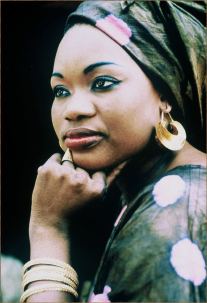
Considering that I’ve been listening to music for many decades, it’s not surprising that I have around 5,000 favorite songs. I’m not exaggerating: I do have 5,000 favorite songs.
Those songs give me pleasure and joy, solace and comfort. I know them intimately, each of them associated with treasured memories. Many of them I can still recall when I first heard them, and why they entered my collection of favorites.
Today I would like to present three foreign language songs. I consider Bengali (my mother tongue), Hindi and Marathi to be domestic languages, and consider English to be a “native” language since I think, read, write and speak it better than any other language. The rest are all foreign languages to me, including French which I understand a bit of.
So here goes. First a song by Oumou Sangaré. Born 1968 in Mali, she’s a Grammy Award-winning Wassoulou musician, sometimes referred to as “The Songbird of Wassoulou”. Wassoulou is a historical region south of the Niger River.”
I first heard it in the late 1990s on a local Berkeley radio station world music program. It was perhaps KALX 90.7 FM, if memory serves.
The song resonates in the sadness register. The arrangement is simple — voice, a simple repetitive bass line, and a guitar. In the middle of the song, there’s a segment where the guitar explores the theme, and then the voice returns. I love that bit especially.
Of course, I don’t know what the words say. The translation is:
The worried songbird cries out in the forest
The worried songbird her thoughts go far away
For those of us who have no father
Her thoughts.. go out to them
The next song is one that I heard on the same radio station in 2011. I was driving back to San Jose after a class I was teaching at Berkeley. I didn’t catch the name of the singer, so when I got home I looked up the station website, and checked out their program listing.
I discovered the singer was Maria De Barros. The song was Nha Mundo (My World.) Bits from the wiki: born in Senegal in 1961; most associated with Cape Verde; growing up in Mauritania; moved to the United States at the age of 11.
I liked the song for its upbeat rhythm. What made me fall in love with this song was the saxophone in the background. You have to make a special effort to hear its beauty. The voice and other instruments can easily mask it. You have to tune out the rest and focus only on the sax playing in the background. Listen to the song, of course, but listen to it again this time just listen to the sax starting around 2:30 timestamp.
I couldn’t find the version I love on YouTube. Here’s the version of Nha Mundo I have:
The wiki says that Maria considers Cesária Évora to be her godmother and inspiration. That’s great since the next song is by Cesária Évora.
It’s a song that has been covered by dozens of singers. Besame Mucho (“Kiss me a lot”) the wiki says “is a bolero song written in 1940 by Mexican songwriter Consuelo Velázquez; one of the most popular songs of the 20th century; recognized in 1999 as the most recorded and covered song in Spanish.”
The lyrics:
Bésame, bésame mucho
Como si fuera esta noche
La última vez
Kiss me more, kiss me much more times
as if this beautiful night is
the very last time
Bésame, bésame mucho
Que tengo miedo a perderte
Perderte después
Kiss me more, kiss me much more times
because I fear I will lose you
I’ll lose you sometime
Bonus video:
I have a brief video of Remi dancing to the song Nha Mundo at my place in San Jose sometime early in 2012. Seen in the video are his sister Cassie, his mother Courtenay, and father Alexis. Also seen is Yoganand, my friend who owned the condo.
Let me know in the comments if you liked any of the songs. Cheers.
